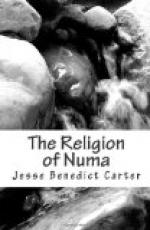Although it was Greek influence which ultimately caused the destruction of Roman religion, and although the cults of Hercules and of Castor are the first definite effects of this influence, it cannot be said that the destruction had in any sense begun, because in their slow journey northward, and in their long residence at Tibur and Tusculum respectively, the two cults had lost all that was pernicious. The Roman instinct, which felt them to be akin to itself, did not go amiss; they were indeed akin to the new Rome with its new interest in trade and its increased interest in warfare, for the trader and the warrior have gone side by side in all ages of the world’s history, whether it be a primitive instinct to grasp territory for commercial purposes or a more civilised endeavour to obtain an open port.
The beginnings of Greek influence have thus been exhibited in the case of Hercules and of Castor, and it remains to inquire what Etruria did. There is no race about which we know so much and yet so little as about the Etruscans. They have always been and still are a riddle, and as our knowledge of them increases we seem further than ever from a solution, and what we gain in positive knowledge is more than counterbalanced by the increased sense of our ignorance. Altogether aside from the problem of the origin of the Etruscans, and the race to which they belonged, is the other problem of their disappearance. In a certain sense Etruria steps out of history quite as mysteriously as she entered into it, nay even more mysteriously, for we are always willing to allow a certain percentage of mystery as the legitimate accompaniment of prehistoric history, but when in the light of more or less historic times a nation steps off the stage of the world’s history, and leaves practically no heritage behind her, we have a right to be amazed. Of all the peoples in Italy Rome ought in the order of events to have been her successor, and yet when we contrast the influence of Etruria on Rome with the influence of the Greek colonies of Southern Italy we see an amazing difference. The influence of these Greek colonies on Rome prepared the way for the direct influence of the Greek motherland, so that one passed over into




